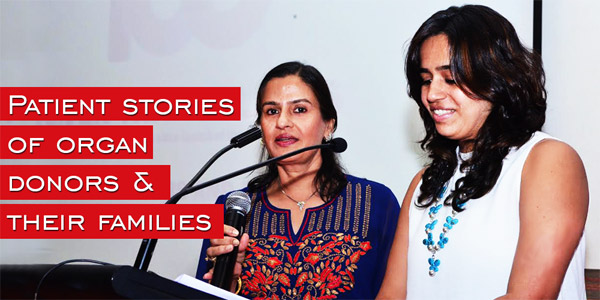Every year thousands of people die while waiting for a transplant in the absence of a suitable donor. The success rate of organ transplant is high but unfortunately not many people come forward to pledge their organs for the good of an ailing patient.
Lack of knowledge and awareness has paved way for many misconceptions, doubts, queries and reservations about organ donation. Information related to organ donation can be easily accessed on the internet but people are still hesitant to pledge their organs. Pratik Kothari and his family faced a very similar situation when they were first informed about their sister’s (Neha Kothari) medical condition. At the age of 27, Neha had her first baby but was soon after diagnosed with Tuberculosis which further resulted in severe liver damage. Soon she slipped into a coma and was on ventilators. She required an immediate Liver transplant. Although her husband volunteered to donate a part of his liver, he couldn’t do so as he had a fatty liver and that’s when Pratik stepped in and offered to help. Due to lack of awareness, the concept of Living donor liver transplant was completely alien to the entire family. With a lot of support and valuable guidance from Dr. Vinay Kumaran and a team of specialists, Pratik Kothari eventually decided to donate the Right Lobe of his Liver to his sister. Considering the severity of Neha’s condition, this transplant surgery took around 13 to 14 hours for successful completion. Being a healthy donor, Pratik was discharged after a week of surgery but Neha took almost a month for complete recovery. Post surgery, both, Neha & Pratik Kothari are living a healthy life and are extremely thankful to the doctors of Kokilaben Hospital for their incredible support and professional services rendered to them throughout this difficult ordeal.
The opportunity to give someone, the gift of life rarely presents itself and when such a medical emergency arises, the family members are often the first ones to step up and grant any kind of assistance to save their loved one’s life. This is exactly what Mrs. Rukaiya Harianawala did for her mother (Mrs. Rukhsana Contractor) who was diagnosed with liver cirrhosis. Knowing how difficult it is to find a donor match these days, it was the most disheartening news that she could ever hear when the doctors informed her that a liver transplant was the only hope for her mother’s survival. Luckily, Rukaiya herself was a match and could donate a part of her Liver to her ailing mother. This surgery is amongst the 100 successful transplants carried out by Dr. Vinay Kumaran and his team. Congratulating them and simultaneously expressing her gratitude for the entire team of doctors at Kokilaben Dhirubhai Ambani Hospital, Mrs. Rukhsana Contractor states that she is happy to be alive and goes on to mention that she is extremely proud of the fact that her own daughter gave her a second life.
It is common for people to donate their organs in part or full to their ailing relative but there have also been several instances whereby individuals have agreed to perform this noble act for strangers solely on humanitarian grounds.
To conclude, let’s just say that the human body has a remarkable fortitude for receiving organs from a near relative or family member. Organ Donation actually saves lives. This is a simple mantra that we would like to endorse and simultaneously encourage everyone to do their bit in giving someone a new lease of life.
Your organs benefit someone else after your death but your memory will live on for the grateful people who receive your organs.
If you are willing to be someone’s life saver, just give us a Missed call on 08080055555
Or
Click here: https://www.organdonationday.in/


